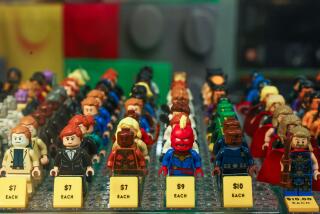Toy Train Giant Lionel Comes to Junction
- Share via
After chugging along for more than a century, Lionel, the venerable maker of model trains, is struggling to stay on track following a nearly $41-million judgment that pushed it into Bankruptcy Court.
The ruling against Lionel, once the world’s biggest toy maker, has exacerbated the company’s problems in an industry marked by intense competition for a small and demanding group of customers.
Despite the confidence of Lionel’s new management, reviving the company is no easy task in an era of video games and Wal-Mart-style retailing, in which all toy train makers are struggling to appeal to new generations. And critics say Lionel has let its younger rivals get an edge by failing to aggressively pursue technological innovations.
But Chesterfield Township, Mich.-based Lionel still has one valuable asset smaller rivals can’t claim: a name steeped in tradition. That goes a long way with the adult train enthusiasts who make up the bulk of the industry’s consumers.
Neil Besougloff, editor of Classic Toy Trains magazine, estimated that there were 100,000 to 125,000 toy train hobbyists in the United States and Canada. The more than 60,000 readers of Classic Toy Trains spend an average of $1,400 to $1,500 a year on the hobby, according to the magazine’s surveys.
“The hobbyists today are mostly men in their 50s,” Besougloff said. “When they grew up in the 1950s, they had Lionel trains and American Flyer trains, and that was their prized toy.... They are to some extent reliving the joys of their childhood.”
So intense is the world of toy trains that Lionel Chief Executive Jerry Calabrese held an online chat three days after the company filed for Chapter 11 bankruptcy protection to assuage fears that Lionel might go under. Calabrese -- who became CEO in October and previously worked for comics heavyweight Marvel Enterprises Inc., a similar hobby-driven business -- said he would hold such sessions regularly.
Lionel’s latest troubles date back at least to 2000, when MTH Electric Trains, formerly known as Mike’s Train House, sued Lionel. MTH, a onetime Lionel contractor based in Columbia, Md., accused the company of selling trains based on designs stolen from a South Korean manufacturer working for MTH. In June, a U.S. District Court jury in Detroit ruled that Lionel should pay $38.6 million to MTH and that Lionel supplier Korea Brass Co. should pay $2.2 million.
Lionel denies the accusations, and Calabrese says he is confident the court award will be overturned or reduced on appeal. In the meantime, Chapter 11, which Lionel entered last month, protects the company from having to post a bond while the appeal is pending.
Calabrese insists that the court decision is the only reason for the bankruptcy filing, and that, overall, the company is in good financial health.
“Lionel is having a better year this year than it had last year, which is something I dare any other train company to say,” he said. As a private company, Lionel does not release its earnings.
Lionel and other toy train makers enjoyed a boom that peaked in 2000. But business slumped amid overproduction and post-9/11 economic uncertainty, Besougloff said.
Andy Edleman, MTH’s vice president of marketing, said MTH had just about caught up to Lionel in market share before 2000. He said Lionel began to slip because it put out the same old models while MTH was adopting new technology and enhanced realism. “They have lived off their reputation,” he said.
Today, features such as sophisticated sound systems and digital remote controls are something customers expect.
Calabrese said Lionel had made more than its share of innovations, but he agreed that MTH and other rivals had forced it to become a better company.
“Lionel is at least 50% of the business,” he said. “It’s very easy to become complacent when you’re that big.”
Moreover, the industry’s primary customers aren’t getting any younger, and if the industry is to survive, it needs to bring children back to the hobby.
Today’s generation doesn’t have the same fascination with electric trains that children used to have. The popularity of train-themed stories and toys for preschoolers, such as Thomas the Tank Engine and wooden railroad sets from Brio, has not carried over into electric train sets.
“There are so many more items competing for children’s attention today than there were back when we were kids,” Besougloff said.
One of the difficulties for Lionel and others is that their products are sold in hobby shops and not where most people buy toys. Wal-Mart Stores Inc., Toys R Us Inc. and other mass retailers don’t carry train sets because they’re too expensive.
But linking a train to a popular children’s character or movie is one way to help revive interest in trains. Lionel won the license for “The Polar Express,” the Christmas movie starring Tom Hanks currently in theaters.
The Polar Express sets, priced at $250, have been a hit, but few have made their way into the hands of kids because established hobbyists snatched them up. The hope is that the movie -- and by extension the train -- will live on as a perennial favorite.
Matthew Kekel, 36, got his first train set as a Christmas present from his father when he was 7 or 8. Today, he shares his hobby with his own son, 3-year-old Andrew.
“It keeps the dad grown down and allows the kids to grow up,” said Kekel, a Chesterfield Township resident.
As for Lionel’s financial struggle, Kekel said he was confident the company would survive: “They’ve changed owners four times since I’ve been buying their product. I’m just not that worried about it.”
More to Read
Inside the business of entertainment
The Wide Shot brings you news, analysis and insights on everything from streaming wars to production — and what it all means for the future.
You may occasionally receive promotional content from the Los Angeles Times.










